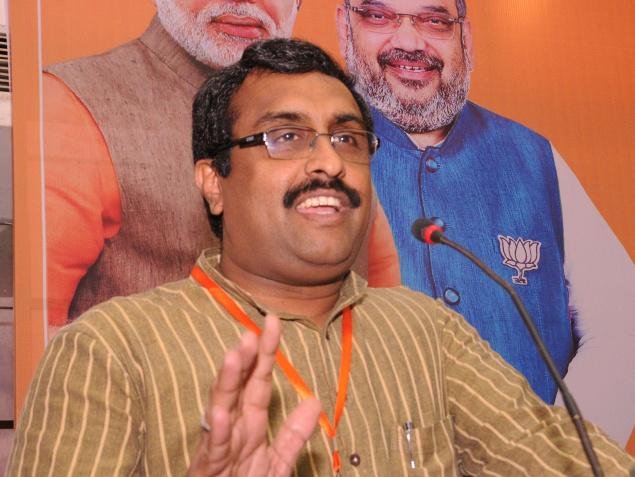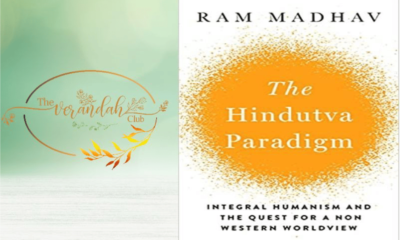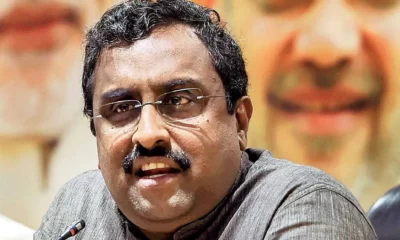
BJP General Secretary Ram Madhav discusses the Assam elections, Jammu and Kashmir, the party’s strategy and more.
As the Modi government’s second anniversary festivities were kicked off at India Gate, where cabinet ministers took to the podium to extol their achievements, a relaxed business atmosphere was palpable at the other end of Rajpath, the ceremonial boulevard, in the Raisina power zone. Ram Madhav, the BJP’s general secretary and RSS pracharak, is popularly seen as the election mascot for the party’s two significant victories in state elections – in Jammu and Kashmir last year and in Assam last fortnight. It was no mean achievement to bring the BJP to power in two border areas, that too for the first time, and it’s not surprising that 53-year-old Madhav has risen to the top, enjoying the trust and confidence of Prime Minister Narendra Modi and party president Amit Shah. In a freewheeling interview Madhav talks about party strategy, his role, the RSS and BJP. Excerpts:
You have emerged as the point person for the BJP in its election strategy and campaign. How would you describe your role and your relationship with Modi and Shah?
I’m no pointsman, that’s a wrong perception of me. We are all workers, who have a task set out for each one of us. We are set targets, we have a job to do and ensure it’s done well. Unlike other parties, we work as a cohesive unit. The government has an agenda, the party has its role, we take it on and all the units work together. I do not believe that once my task is done, I continue to hold on and control the state or its legislators. Our party doesn’t work like that, we believe in ‘anushasan,’ discipline. We simply move on.
With the prime minister and party president, we all have a good working relationship. We work together and share a good rapport. I have been an RSS pracharak for four decades, the prime minister is for longer, we share that together, we can never cut our roots.
How did you clinch the Assam victory, considering you just had five seats before?
There were two major issues in our campaign. One, we promised to bring all round development, the other was about Assamese identity. There is a serious threat from infiltrators across the border on Assamese identity, culture and honour. There was a feeling among people that although there was an agitation, an agreement , two governments in the past were not able to secure the state from infiltrators. We promised them we’ll stop illegal infiltration both by the Centre and state – and this gentleman (Chief Minister Sarbanda Sonowal) will do whatever necessary to stop them.
You dedicated the victory to ‘Ma Kamakhya’ and Brahmaputra. These are Hindu symbols that will appear to exclude the Muslims.
This is purely about infiltrators not about religion. There are a good number of Muslims in Assam, so it’s not about Hindus or Muslims, and how is Ma Kamakya a religion? She is the identity of Assam. Those who believe this is about religion have a twisted thinking, but it’s about security of a state, people are concerned, illegal immigration is an issue.
Does the Congress tally of 14 Muslim members of legislative assembly (MLAs) out of the meagre 26 say something?
Basically they have won in constituencies where Muslim votes are big, and our slogan of stopping infiltrators was not received well there. However, the BJP too has won 12-13 seats in constituencies where there is a large Muslim majority.
Are they Muslim MLAs?
No, the BJP has only one Muslim MLA. By the way, we have one Christian MLA too.
Would you grant that former Congress strongman Himanta Biswa Sarma, who joined the BJP, was crucial in your victory?
This election was about strategising and we were always one step ahead of the Congress, which was crucial in our victory. We were successful in forging the alliances withAsom Gana Parishad (AGP) and the Bodos, and whatever the Congress may say today, they were desperately trying to get both the parties on their side. The Congress even tried with All India United Democratic Front’s Badruddin Ajmal – they invited both AGP’s Prafulla Mahanta and Ajmal to Patna for the swearing-in of Nitish Kumar – that’s when they hoped to clinch it, and had they succeeded, things may have been different.
We also kept the campaign local while the Congress tried to drag in national issues causing confusion in the minds of people. And, unlike before, we put the emphasis on the state leadership, responsibilities on local leadership. Sure, the prime minister and party president came but the major faces of the campaign were Sonowal and Sarma.
How would you manage the personal ambitions of new entrants, and of partners like the PDP in J&K, who are not your natural allies? The BJP has made Sarma convenor of the newborn North East Democratic Alliance, barely hours after Sonowal’s government was sworn in.
No alliance is easy. In J&K we have forged an uncommon alliance there – Muftisaab (the late Mufti Mohammed Sayeed) used to call it South Pole and North Pole coming together. We had a common objective, a common goal for coming together. It’s the goal that keeps us united. It’s a year since we came together, we started off on rocky ground, then Muftisaab dies, there was a three-month gap before his daughter Mehbooba [Mufti] took over, but the alliance has now matured, it’s finally on track.
What is the key factor for such alliances? Is there no dilution of ideology?
You’ve got to have clarity on your ideological issues, at the same time you need flexibility to be able to sail with your opponent. On issues like Article 370, AFSPA, Kashmiri Pandits, Hindus in West Pakistan, the BJP and PDP were on opposite sides, and it was our respective stands that delayed the formation of government. It took us two full months of negotiations to come to a common minimum program (CMP), whereas that of governance, development and the like was completed in one week. We both took a pragmatic stand on ideological issues – they want to strengthen Article 370, we want to weaken it – we decided to maintain status quo.
How do you react to Mehbooba’s statement of disallowing sainik (soldier) and Pandit colonies in the Valley?
Statements are always misinterpreted most of the time in J&K. The sainik colony is a local issue, it is not in the CMP. The sainik colony idea was started in Omar Abdullah’s time, he was the one who allotted land to ex-soldiers but it’s sought to be made into a controversy now. It will be a decision taken by the state government. As far as the return of Kashmiri Pandits is concerned, we’ve committed in the CMP that they will return to the Valley with dignity, honour and security. It will be done in consultations with the Pandit leadership – what do they want there, how do they come back – we’ll also talk to other stakeholders in the state.
But there is utter dishonesty in the utterances of separatist leaders today; both hardline and moderate separatists were on record stating that without Pandits, Kashmir is not complete. Why are they opposing it today?
Because they are afraid a sainik colony will change the demographics of the Valley?
It’s a colony for ex-soldiers of J&K, the state does not belong to Kashmir alone!
What’s your next project for elections?
We are a political party, it’s not a project. We have to concentrate on the whole Coromandel coast, it will include Kerala, the entire Tamil Nadu, Andhra Pradesh, Bengal, Orissa and then entire North-East. This is the belt where we have great scope of increasing our seats in the next Parliament elections. Today, we have minimal presence in this region, so it offers us a great opportunity if we expand our footprint there in 2019. It’ll be our focus area.
It is well known the RSS plays a crucial role in elections, but is never given credit? Are you still an RSS pracharak?
I’m not an office bearer of the RSS anymore, I’m now in the BJP, but my connection with the RSS will always remain. The RSS is not a political party, it works at the community level; it has a different work cut out for itself.
The RSS may have a big presence in Kerala but it has not been able to get any seats in elections. Yes, the RSS will continue to work in North East, we acknowledge their contribution; but their work is not to get votes for the BJP. RSS cadres that work in an area may voluntarily mobilise voters but there’s no order they should do so. The BJP has to work on its own for votes.
The so-called Left liberal’s control of universities and cultural centres has been a bane of the RSS-BJP. Would it be better to set up institutes with your narrative rather than turn campuses into ideological and political battlegrounds?
I disagree campuses are battlegrounds today; the universities do not belong to the Left, they have only managed to add some nuisance value in the campuses. Universities belong to everybody, there’s no Left or Right bastion. Our effort for a different narrative is going on whether we are in power or not, the process is on. Our organisations have their own schools, institutes; we have dozens of magazines etc, but certain national assets have to remain national assets.
The BJP has called for a Congress-mukt India, but is there a need to start wiping out [Jawaharlal] Nehru from school text books?
The RSS and BJP has not said there should be a campaign to wipe out Nehru. In Tripura, there’s no mention of Nehru in textbooks, so should Communists be accused of wiping out Nehru? There’s been talk about one state, taking out Nehru in one chapter, in one class, and I don’t even know if it’s true. However, just because Nehru is missing in one little lesson, there’s a deliberate campaign that is unleashed? In our history, there were great leaders who have been wiped out and nobody talks about it?
In this country, right from street corners, airports, railway stations, bus stands, there’s only one family name – Nehru, Indira Gandhi, Rajiv Gandhi; now other Gandhis will follow too. Hundreds of institutes, programs of the government are named after one family, so no one needs to worry about being wiped out. This campaign is wrong, no one is trying to wipe out Nehru, but for historic reasons, every leader should get their credit.
But there’s a vilification campaign against Nehru. He’s been called Jinnah’s son and the like on social media?
When people talk about vilification, have you seen the kind of vilification the RSS leadership has faced all these years? There’s so much of rubbish, nonsense written even now – the other day, I saw a great intellectual writing in his book that Hedgewar met Hitler and Mussolini.
Can you name him?
I cannot remember just now.
The vilification on social media is sexual and violent against critics of RSS and BJP, and does not spare politicians, media or celebs? Do you agree?
The amount of abuse our party women face is equally sexual and violent, you cannot say only a particular set faces it.
Can you name who have been targeted?
I won’t name them, it would be an insult to them by naming them. Yes, trolling is bad, everyone faces it but it’s now become a grievance industry. Let’s not invent grievances, an imagined grievance, and play victim. You have to learn to deal with it. Take a look around.



